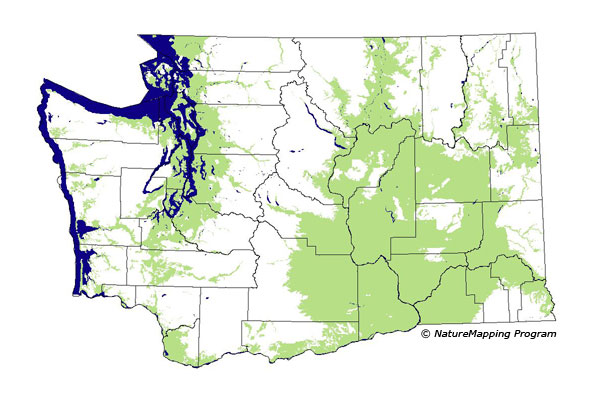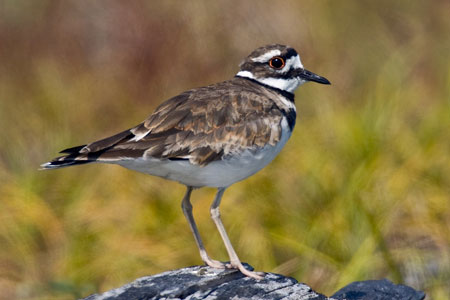


Killdeer (Charadrius vociferus) What they look like: The Killdeer is the largest of the ringed plovers, and the only plover in its range with a double breast band. Killdeers have brown upperparts, white underparts, and orange rumps. The eyes are dark with a bright red eye ring (see photo below). In flight, the Killdeer's long, slender wings have conspicuous white wing stripes. Adults and juveniles look the same year round, but young, downy chicks have a single breast band.
Both sexes have the same type of plumage, but the male is larger than the female.
Length: 20-28 cm (8-11 in)
Calls:
Loud piercing "kill-deer." Where they live: Killdeers frequent a variety of open habitats such as fields, meadows, gravel bars, and mudflats throughout the United States and most of Canada. Killdeers are present in Washington throughout the year, especially west of the Cascades. The Killdeer is our most common breeding shorebird. It occurs in a number of unforested habitats, including swales and coulees in sagebrush, farmland, grasslands, city park playing fields, residential lawns, gravel parking lots, and gravel roofs. The basic requirements for foraging are a sandy/gravelly substrate, and nearby wet or muddy areas. 
What they eat: Killdeers feed mainly on ground invertebrates such as earthworms, beetles, grasshoppers, and snails. They occasionally eat seeds and small vertebrates. Nesting: They require a sandy or gravelly substrate for nesting near a wet or muddy area where they can forage.
Behavior: Although many species of birds pretend to have a broken wing to lure predators from their nest, the Killdeer is the one most commonly seen performing this distraction display. The broken-wing act used to lead predators from the nest would not keep a cow or horse from stepping on the eggs. To guard against large hoofed animals, the Killdeer uses a quite different display, fluffing itself up, displaying its tail over its head, and running at the beast to attempt to make it change its path. Did you know?
More Information
Killdeer - All About Birds Animal silhouettes available to purchase » Photos: Natures Pics Home | About Us | How to Participate | Biodiversity Modules | Projects | Maps | News | Resources |